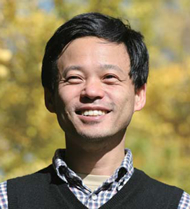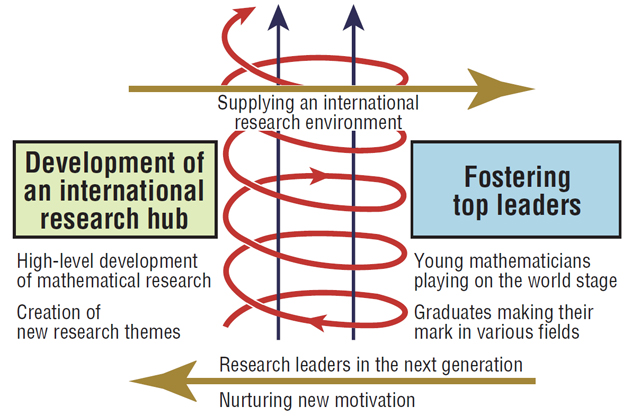Global Center of Excellence (GCOE) Programs
Fostering Top Leaders in Mathematics — Broadening the Core and Exploring New Ground

Program Leader:
Prof. Kenji FUKAYA
Mathematics provides the conceptual foundation of, as well as powerful applications in, various fields of science and technology. Therefore the teaching of, and research into, mathematics is essential for Japan’s further development. The running bodies of our GCOE project are the Department of Mathematics and Research Institute for Mathematical Sciences of Kyoto University, both of which rank among the leading institutions of mathematics in the world. Capitalizing on this advantage, our GCOE project plans to address the following two points:
- (1) Mathematical research in Japan is currently among the best in the world, but it has been noted that the number of young researchers has begun to thin out. We aim to foster world leaders in mathematics for the next generation.
- (2) At the same time, in our hightech world there is an increasing need for mathematically accomplished professionals. We aim to supply society (including academic fields outside mathematics) with individuals with high mathematical expertise.
Our GCOE project consists of three parts, which will cooperate closely with each other to achieve the objectives.
(1) Fostering Top Leaders in Mathematical Research.
Mathematicians tend to show their talent when they are young. Hence it is extremely important to give them opportunities to establish themselves in the early stages of their career.
- (i) We offer positions (from postdoctoral to tenure-track levels) to outstanding young researchers who are to be the mathematical leaders of the next generation. We provide them with a research environment with freedom and stability.
- (ii) We promote international exchange at the graduate and post-doctoral levels by sending young researchers overseas, and by accepting international graduate students at our institutions, so that they can build an international research network.
- (iii) We enable Ph.D. students to be actively involved in teaching and research as Teaching Assistants and Research Assistants. This also provides them with a financial base during their study.
- (iv) We run short-term intensive courses for undergraduate students in order to motivate them to pursue a Ph.D. in mathematics.
(2) Training Graduate Students for Work in Various Fields.
Experts in mathematics can contribute to various fields in academia, industry, and society. This is, however, not always fully recognized by industry and society in Japan.
An advisory board of company executives and researchers are appointed from the banking, insurance, construction, information technology, bioscience, and economics sectors. Lectures and seminars will be given by experts in those fields in order to train graduate students to become mathematically skilled professionals, capable of working in a range of industries and research institutes. Our programs include:
- (i) Ph.D. level insurance mathematics;
- (ii) Cooperation between the Kyoto University Institute of Economic Research and the Natural Sciences Research Institute (RIKEN) to pursue new dialogue between mathematics and other disciplines;
- (iii) A program to enhance the teaching skills of young mathematicians, who are likely to teach math courses when hired for academic positions in the future;
- (iv) A program to foster excellence among junior and senior high school teachers;
- (v) Teaching mathematics using computers.
(3) Development of an International Mathematics Research Center.
In order to further enhance our mathematical research, the activities of our GCOE project are being carried out by four research groups focusing on the following areas:
[G1] Integration of number theory and algebraic geometry; [G2] Global symmetry with infinitely many degrees of freedom; [G3] Mathematical analysis of complex phenomena; [G4] Applied mathematics of computation and optimization.


